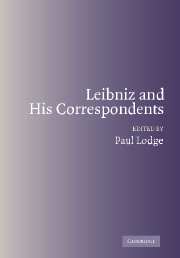Book contents
- Frontmatter
- Contents
- Contributors
- Abbreviations
- Acknowledgments
- 1 Introduction
- 2 Leibniz and His Master: The Correspondence with Jakob Thomasius
- 3 A Philosophical Apprenticeship: Leibniz's Correspondence with the Secretary of the Royal Society, Henry Oldenburg
- 4 The Leibniz–Foucher Alliance and Its Philosophical Bases
- 5 Leibniz to Arnauld: Platonic and Aristotelian Themes on Matter and Corporeal Substance
- 6 Leibniz and Fardella: Body, Substance, and Idealism
- 7 Leibniz's Exchange with the Jesuits in China
- 8 Leibniz's Close Encounter with Cartesianism in the Correspondence with De Volder
- 9 “All the time and everywhere everything's the same as here”: The Principle of Uniformity in the Correspondence Between Leibniz and Lady Masham
- 10 Idealism Declined: Leibniz and Christian Wolff
- 11 On Substance and Relations in Leibniz's Correspondence with Des Bosses
- 12 “[…] et je serai tousjours la même pour vous”: Personal, Political, and Philosophical Dimensions of the Leibniz–Caroline Correspondence
- References
- Index
8 - Leibniz's Close Encounter with Cartesianism in the Correspondence with De Volder
Published online by Cambridge University Press: 02 September 2009
- Frontmatter
- Contents
- Contributors
- Abbreviations
- Acknowledgments
- 1 Introduction
- 2 Leibniz and His Master: The Correspondence with Jakob Thomasius
- 3 A Philosophical Apprenticeship: Leibniz's Correspondence with the Secretary of the Royal Society, Henry Oldenburg
- 4 The Leibniz–Foucher Alliance and Its Philosophical Bases
- 5 Leibniz to Arnauld: Platonic and Aristotelian Themes on Matter and Corporeal Substance
- 6 Leibniz and Fardella: Body, Substance, and Idealism
- 7 Leibniz's Exchange with the Jesuits in China
- 8 Leibniz's Close Encounter with Cartesianism in the Correspondence with De Volder
- 9 “All the time and everywhere everything's the same as here”: The Principle of Uniformity in the Correspondence Between Leibniz and Lady Masham
- 10 Idealism Declined: Leibniz and Christian Wolff
- 11 On Substance and Relations in Leibniz's Correspondence with Des Bosses
- 12 “[…] et je serai tousjours la même pour vous”: Personal, Political, and Philosophical Dimensions of the Leibniz–Caroline Correspondence
- References
- Index
Summary
Much of Leibniz's philosophy can be seen as a direct response to the views of Descartes. Sadly, there was no interaction between these two giants. Leibniz was only three years old when Descartes died, and even he had not begun to court the favor of luminaries from the Republic of Letters at this tender age. However, two of the most important of Leibniz's correspondences, with Antoine Arnauld and with Burchard de Volder, allow us to gain some insight into how he might have interacted with the master. The latter correspondence will be my concern here.
Scholars have long recognized the importance of Leibniz's correspondence with De Volder and have drawn frequently on passages from Leibniz's letters, both in book-length studies and in recent debates over the precise nature of his mature ontology. However, De Volder's contribution to the correspondence has received little attention, despite the fact that an understanding of the views which both correspondents bring to the discussion is essential for a proper interpretation of Leibniz's pronouncements.
The main role which De Volder plays in his correspondence with Leibniz is that of apologist for a particular brand of Cartesianism. De Volder's abilities as a disputant, and his genuine perplexity concerning the nature of the material world, force Leibniz to illuminate his own views in opposition to Cartesian doctrines on substance, matter, and motion.
- Type
- Chapter
- Information
- Leibniz and his Correspondents , pp. 162 - 192Publisher: Cambridge University PressPrint publication year: 2004
- 5
- Cited by

